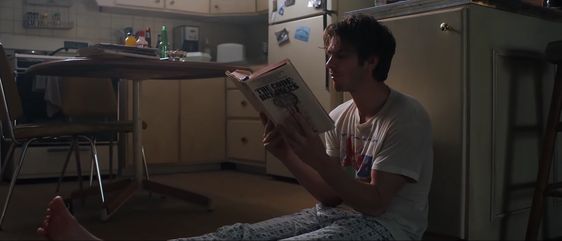What if all the stories, the outlandish and the scandalous, you’d ever heard about Hollywood were true? What if you cracked the code and found all the hidden messages in those rock songs, video games and movies? What if you solved the mystery and no one cared? Does the solution of the mystery matter or do we only like mysteries for their mysterious nature? Do the facts really matter or do we prefer the fiction?
There’s a lot going on in Under the Silver Lake, for instance: the modern mythology of Hollywood, the captivating nature of conspiracy theories, society’s obsession with pop culture and its icons, audience entitlement, symbolism in media and how its intrinsically tied to white patriarchy, how we treat talent and the cultures we build up around the media we consume and the people who create it.
This movie plays with the ‘neo noir’ genre, taking its style and tropes to say something about films, and by extension all media, and mysteries. In itself, it’s something of a stroke of genius, a meta analysis of Hollywood through one of its most icon genres.
The real world is mostly devoid of actual mystery and most especially of the kind you will find in any noir movie or Agatha Christie novel, the answers are rarely satisfying and it’s certainly never all wrapped up with a nice little bow on top.
People usually like to know what something means. They spend hours online, post their own takes to twitter, watch youtube videos of other people discussing it, talk to their friends about it, they look for interviews with the creators and those involved in its making all in order to figure out what it all meant. Why? Why do we do that?
Andrew Garfield’s character is a self interested, self-entitled, hater of the homeless, complete and total burn out who finds himself at the centre of a mystery that has pretty much nothing to do with him and at the end the answers don’t really even matter. He learns basically nothing and was he even actually interested in finding out the truth anyway? At the end of the movie we don’t know much more than we did at the beginning. Garfield’s character is just like a million other guys out there, you probably know someone at least a bit like him. Oh and he’s probably maybe the dog killer but that doesn’t matter either. Does any of it matter? Is it important that anyone finds out what this movie means?
David Lynch once said that he hates talking about his movies because the movies “are the talking”. And there’s a part of me that wonders if this movie is a commentary on that, how we, as a society, build our own mythologies around the media we consume and these stories take over and become bigger than the media itself or the people we’re talking about, how we make these mythologies because the real world is so unsatisfying.
I think this phenomenon is most well portrayed by the now infamous story of the screening of the Lumiere brothers’ “L’arrivée d’un train en gare de La Ciotat”, a short film that documents the arrival of a train to a station. The story goes that as the train came closer and closer to the camera, the audience erupted with fears and hysterics because they thought that the train was about to break through the screen and hit them. It’s a great story, but it most certainly did not happen (youtuber Jacob Geller has a wonderful video about this continued phenomenon here https://www.youtube.com/watch?v=w2DP-A6FhA0).
Where these falsities stop simply being tiny pieces of trivia that hold no real weight and are easily debunked and turn into dangerous swelling conspiracies is at the intersection of disenfranchisement and the directionless desire for something more. There comes a point where interest becomes obsession and all logic flies out the window. Take any garden variety conspiracy theory, for the most part, they start out as a vague interest in some mystery without any answer that the subject find satisfying. And that’s the rub because it seems that whether the mystery has actually already been solved or not rarely seems to matter, what does seem to matter is find a satisfying solution. Their obsession is fuelled by the notion that there has to be more because the actual reality does not meet their standards. But as I said before, when is real life ever satisfying?
You can’t live in fiction, reality will not satiate your desire for a satisfying narrative, real life does not have a three act structure, there are no real heroes and there are no prizes for figuring out the mystery, life goes on with or without you, reality does not care about you and you have to make your peace with that. And maybe that’s what Under The Silver Lake is about, maybe not, who knows, maybe that’s the point.
